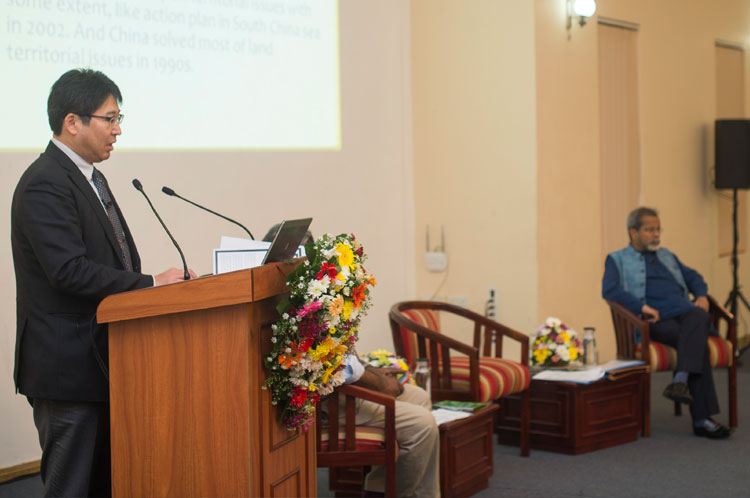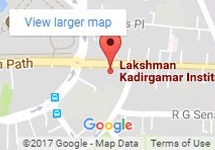
Reading Time: 5 min read
LKI was pleased to have Prof. Shin Kawashima, of the Department of International Relations at the University of Tokyo, deliver a lecture on “Maritime Policy in the Indo-Pacific” on 20 December 2016. LKI also welcomed insights from Prof. Imtiaz Ahmed, Executive Director of the Regional Centre for Strategic Studies. The event was chaired by Dr. Paikiasothy Saravanamuttu, member of LKI’s Board of Management.
In his opening remarks (see below for a transcript), Dr. Saravanamuttu emphasised the uncertainty of global politics following November 2016, which would decide the viability of concepts such as the Indo-Pacific. He pointed out that the Indo-Pacific was currently more of a geographic construct than a strategic reality, given the difference between US hegemony in the Pacific and the plurality of great power interests in the Indian Ocean. Nevertheless, given that India had indicated that it was ‘set to sail’ in the Indo-Pacific, he stated that the imperative was to put away traditional paradigms and think anew about regional security.
https://soundcloud.com/lk_institute/remarks-by-paikiasothy-saravanamuttu?in=lk_institute/sets/maritime-policy-in-the-indo
Professor Kawashima’s lecture traced the history of Chinese foreign policy in the Indo-Pacific and highlighted how it has changed in recent years. He argued that the somewhat flexible foreign policy of the Deng Xiaoping era was being replaced by a more uncompromising attitude towards territorial and security issues. With regard to maritime regions like the Indo-Pacific, he pointed out that China had a unique conceptualisation of ‘blue territory’, which demarcated maritime regions adjacent to the Chinese coast (such as the South China Sea) as Chinese ‘territory’. Prof. Kawashima also stated that the current Xi Jinping administration had a two-pronged approach to foreign policy, where China would responsibly contribute to global society on one hand, and become increasingly assertive in its neighbourhood (including the Indo-Pacific). To view the PowerPoint of Professor Kawashima’s presentation, click here.
https://soundcloud.com/lk_institute/chinese-foreign-policy-and-the-indo-pacific-by-shin-kawashima?in=lk_institute/sets/maritime-policy-in-the-indo
In his presentation, Professor Ahmed conveyed that different civilisations have different perspectives towards concepts such as the Indo-Pacific. He argued that emerging concepts like the Indo-Pacific cannot be adequately explained via traditional realist paradigms, and highlighted the value of Asian perspectives that used the human individual (rather than the nation-state) as their conceptual core. Prof. Ahmed maintained that the value of such perspectives was further heightened by the rise of globalisation. On the question of how South Asia, and by extension the Indo-Pacific, could continue to rise in the face of anti-globalist trends, Prof. Ahmed emphasised that investment in people, i.e. human capital, is the key.
https://soundcloud.com/lk_institute/south-asian-perspectives-by-imtiaz-ahmed?in=lk_institute/sets/maritime-policy-in-the-indo
The lecture and discussion was attended by a diverse audience, including representatives of think tanks, the Foreign Ministry, the Navy, the diplomatic corps, universities, and the private sector. Many thanks to the Embassy of Japan in Sri Lanka for their support in facilitating this lecture at LKI, and to the speakers and Dr. Paikiasothy Saravanamuttu for chairing the session.
Further reading on Maritime Policy in the Indo-Pacific
1. ‘Indo-Pacific Maritime Security: Challenges and Cooperation’, David Brewster (ed.), National Security College, Australian National University, July 2016.
2. ‘Advancing Maritime Cooperation in the Indo-Pacific’ by Nilanthi Samaranayake, Galle Dialogue 2016.
3. ‘Japan’s Indo-Pacific policy’ by Takashi Shirahashi, background paper for the Carnegie Endowment for International Peace, 30 October 2015.
4. ‘A Term Whose Time Has Come: The Indo-Pacific’ by Rory Medcalf, The Diplomat, 4 December 2012.
5. Address by Hon. Ranil Wickremesinghe, Prime Minister of Sri Lanka, on ‘Sri Lanka and its place in the world’ made at Wellington, New Zealand, 3 October 2016.
6. India-Japan Joint Statement during the visit of the Prime Minister of India to Japan, 11 November 2016.
Transcript of Dr. Paikiasothy Saravanamuttu’s Opening Remarks on Maritime Policy in the Indo-Pacific
Excellencies, Professor Kawashima, Professor Imtiaz Ahmed, Ladies and Gentlemen,
It indeed gives me great pleasure to be able to chair and moderate this discussion, on a topic of considerable relevance and interests to us here in Sri Lanka at the present day. One of the points about discussing policy internationally at the present moment, is that everything is conditioned by the fallout, as it were, and falling out that continues from the events of early November 2016.
I think, whether we liked it or not, agreed with it or not, we lived in a kind of Pax Americana world, in which the ultimate provider of stability and certainty, or to put it in the terminology of international relations, the balancer in the balance of power, was invariably the United States of America. We now, I think, face a situation in which that no longer can be taken for granted. It’s a period of uncertainty, probably the period of the greatest uncertainty since the post war – the post 1945 world – where America emerged as the hegemon, and we had, in effect, a Pax Americana.
So, we are talking about policy, talking about strategy, and we are talking about security, where the apparent certainty is precisely the opposite; of a degree of uncertainty, of not being able to predict what exactly could happen. The hegemon has gone into, or seems like is going into, an isolationism, and if not an isolationism, a unilateralism which is equally disturbing, unnerving, and worrying. Now we have before us the question of identifying the challenges, the stresses, the strains, the opportunities and promise of a maritime policy in the Indo–Pacific.
We coin terms, sometimes fanciful, sometimes fruitful, and I think it is only fair and candid to ask as to whether, beyond a kind of geographical expression, the Indo-Pacific really holds any kind of strategic significance as far as a new balance of power is concerned.
I am aware that our Prime Minister, the Honourable Ranil Wickremesinghe, earlier on this year in a speech in New Zealand, talked about it as more of a conceptual premise than a reality, and pointed to features within the Indian Ocean region – as opposed to the Pacific Ocean – which are quite different from each other. Key amongst them, of course, was that the United States saw the Pacific Ocean as very much integral to its security, and therefore was the undisputed power in the Pacific, whereas in the Indian Ocean the situation was a lot more heterodox. You had a number of competing powers, and at the same time also, an almost axiomatic faith – certainly through the 70s – that the Indian Ocean should be a zone of peace, that it should not be dominated by a single power, and that a plurality of interests – the space should be maintained for that plurality interests to be at play.
Now in 2016, as we all know, it is a different world, in that the importance of the Indian Ocean has increased considerably. We are talking about populations that are over two billion in this region. We are talking about two thirds of the world’s oil supplies going through these waters, we are talking about two of the world’s biggest, greatest economies in this region as well, and what we therefore have to try to achieve is to ensure that you have a space for peaceful competition rather than a site for conflict. Indeed, some people have argued that the very coining of this term, Indo-Pacific, masks an attempt on the part of certain powers to form an alliance against others. Quite simply, the Americans have been accused of coining this term as a way of trying to co-opt India, for example, in to an anti-Chinese alliance in the region.
There are others, who nevertheless point out that it is perfectly understandable that the Chinese do have interests in this region and that is also perfectly possible for these two great Asian powers to work together towards mutual benefit, as indeed the statistics now show in terms of their trading relationships. An Indian journalist, reviewing a speech made by the Indian Defence Minister at the recent Shangri La Dialogue in Singapore, makes the point that, whilst previous Prime Ministers – and he refers to a former Indian Prime Minister as well, Manmohan Singh – he says that while they dipped their toes in this Indo- Pacific idea, Prime Minister Modi and India are now set to sail within these waters.
So it is a world that is changing; and therefore, the key guideline that we require, I think, is to put away the old ideas and paradigms which have determined security policy in particular in this region, in very strong balance of power terms, and to recognize that, into the future, into the 21st century, whilst those old animosities will not be extinguished, they certainly may not be the most decisive. Out of this uncertainty, we are making history, and perhaps we would be less frightened if we recognize that we are making history, rather than be paralyzed by the uncertainty.
END
Photos: Fluke, by Ruvin de Silva



